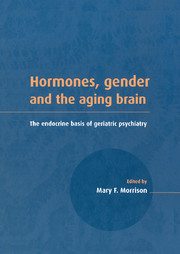Book contents
- Frontmatter
- Contents
- List of contributors
- Preface
- Acknowledgments
- Part I Overview
- Part II Hormones and mental health in the elderly
- 3 The hypothalamic–pituitary–adrenal axis in aging: preclinical and clinical studies
- 4 The hypothalamic–pituitary–thyroid axis
- 5 Estrogen and depression in aging women
- 6 The role of testosterone in male depression
- 7 Dehydroepiandrosterone in aging and mental health
- 8 Sex hormones, cognition, and dementia in the elderly
- 9 Effects of estrogen on basal forebrain cholinergic neurons and cognition: implications for brain aging and dementia in women
- 10 Gender and schizophrenia
- 11 Sex steroids and anxiety disorders
- 12 Gender and hormonal factors in pain and pain inhibition
- Part III Effects of hormones and behavior on immune function
- Part IV Hormones and gender differences in psychotropic drug metabolism
- Index
10 - Gender and schizophrenia
from Part II - Hormones and mental health in the elderly
Published online by Cambridge University Press: 18 September 2009
- Frontmatter
- Contents
- List of contributors
- Preface
- Acknowledgments
- Part I Overview
- Part II Hormones and mental health in the elderly
- 3 The hypothalamic–pituitary–adrenal axis in aging: preclinical and clinical studies
- 4 The hypothalamic–pituitary–thyroid axis
- 5 Estrogen and depression in aging women
- 6 The role of testosterone in male depression
- 7 Dehydroepiandrosterone in aging and mental health
- 8 Sex hormones, cognition, and dementia in the elderly
- 9 Effects of estrogen on basal forebrain cholinergic neurons and cognition: implications for brain aging and dementia in women
- 10 Gender and schizophrenia
- 11 Sex steroids and anxiety disorders
- 12 Gender and hormonal factors in pain and pain inhibition
- Part III Effects of hormones and behavior on immune function
- Part IV Hormones and gender differences in psychotropic drug metabolism
- Index
Summary
Introduction
The heterogeneity of schizophrenia has greatly challenged efforts to understand the etiology and pathophysiology of this disorder. Gender has been recognized for a long time as one of a number of factors that may contribute to the heterogeneity of schizophrenia, but only recently have researchers systematically examined the role of gender in the development of schizophrenia and in the modification of its expression. Recent literature reviews of gender differences in schizophrenia found gender differences in various aspects of the schizophrenic syndrome, including age of onset of illness, symptom presentation, course of illness, cognitive performance, neuroradiological abnormalities, and response to antipsychotic medication (Andia & Zisook, 1991; Yassa & Jeste, 1992; Yassa et al., 1991; Tamminga, 1997). A number of other published studies, as well, found gender differences in aspects of the schizophrenic syndrome (Szymanski et al., 1995; Gur et al., 1996; Hafner et al., 1998).
Our own findings suggest that gender accounts for some of the heterogeneity in the varying clinical presentations of schizophrenia; however, the lack of differences on neuropsychological measures suggests that the cognitive deficits seen in schizophrenia are similar in male and female patients (Andia et al., 1995).
Age of onset of schizophrenia
Age of onset of schizophrenia has usually been found to be later in women than in men, regardless of study design, culture, definition of schizophrenia, or definition of age of onset (Loranger, 1984; Castle & Murray, 1993; Hafner et al. 1989, 1998; Angermeyer & Kuhn, 1988; Hambrecht et al., 1992).
- Type
- Chapter
- Information
- Hormones, Gender and the Aging BrainThe Endocrine Basis of Geriatric Psychiatry, pp. 223 - 240Publisher: Cambridge University PressPrint publication year: 2000
- 1
- Cited by



